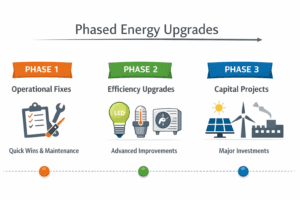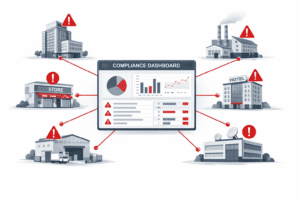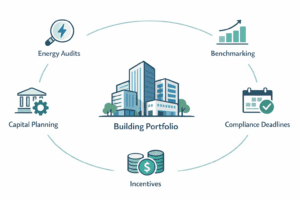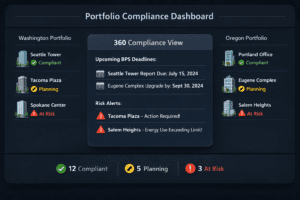Benefits of Energy Benchmark Compliance for Your Business
As energy costs continue to rise and environmental concerns become more pressing, many businesses seek ways to reduce their energy consumption and improve sustainability. One effective strategy for achieving these goals is energy benchmarking, a process that compares a business’s energy use to industry standards and identifies opportunities for improvement.
Energy benchmark compliance involves meeting certain energy efficiency standards and regulations, which can benefit businesses. This article will explore how energy benchmarking program compliance can help your business, including reducing energy costs, improving operational efficiency, and enhancing your company’s reputation as a socially responsible organization.
Basics Of Energy Benchmarking
Energy benchmarking is the process of comparing a building’s energy performance to industry standards or a set of predetermined metrics. The goal of building energy performance benchmarking is to identify areas for energy efficiency improvements and reduce energy costs.
The basic steps involved in energy benchmarking include the following:
Collecting Energy Data
The first step in energy benchmarking is collecting energy data for the whole building data itself. This includes data on electricity, natural gas, water, and other energy sources used in the building.
Normalizing Energy Data
To compare energy use across different buildings, building types or time periods, energy data needs to be normalized for factors such as weather, building size, gross floor area, occupancy, and hours of operation.
Benchmarking Energy Use: Once the building owner’s energy data has been normalized, it can be compared to industry standards or other benchmarking metrics to determine how the building’s energy use compares to similar buildings nationwide.
Identifying Energy Efficiency Opportunities
Based on the benchmarking results, potential energy efficiency opportunities can be identified. This may include upgrading equipment, implementing energy-efficient measures, or changing operational practices.
Implementing Energy-Saving Measures
Finally, energy-saving measures can be implemented based on the identified opportunities. This may involve upgrading equipment, installing energy-efficient lighting, or implementing behavior-based energy and water-saving programs across multiple buildings.
Overall, energy benchmarking is valuable for identifying energy efficiency opportunities and reducing energy costs. By benchmarking energy use and identifying opportunities for improvement, businesses can reduce their environmental impact, save money, and contribute to a more sustainable future.
What Is Energy Benchmarking Compliance?
Energy benchmarking compliance is the process of measuring energy and water data and comparing a building’s energy performance against industry standards and regulatory requirements. This involves collecting data on a building’s energy use, analyzing it, and comparing it to similar buildings or industry benchmarks. The goal of using building and energy data for benchmarking compliance is to identify areas where energy efficiency improvements can be made, reduce energy costs, and help meet regulatory requirements.
Energy benchmarking typically involves software tools and modeling to analyze building energy use data. This data can include information on a building’s energy consumption, peak demand, and greenhouse gas emissions. By analyzing this data, businesses can identify opportunities to improve energy efficiency, such as upgrading equipment, implementing energy-saving measures, or improving building insulation.
Many governments have regulations requiring businesses to comply with energy benchmarking requirements. For example, in the United States, several cities have enacted energy benchmarking and disclosure ordinances that require building owners’ privately owned buildings to report their energy use data to the city government annually. Compliance with these requirements can result in penalties or fines for non-compliance.
Energy benchmarking compliance is important for businesses looking to reduce energy costs, improve energy efficiency, and meet regulatory requirements. By collecting and analyzing energy data, businesses can identify opportunities for improvement, track energy use, make informed decisions about energy-saving measures, and contribute to a more sustainable future.
Ways in which energy benchmark compliance can help your business

Energy benchmark compliance can provide numerous benefits for businesses, including:
Reducing energy costs
By benchmarking energy use and identifying areas for improvement, businesses can implement energy-saving measures that can significantly reduce their energy and utility bills alone. This can help businesses save money in the long run and improve their bottom line.
Improving operational efficiency
Benchmarking energy use can also help businesses identify inefficiencies in their operations and processes, allowing them to optimize their energy use and reduce waste. This can lead to improved operational efficiency, which can positively impact productivity and profitability.
Enhancing reputation
Energy benchmark compliance can help businesses enhance their reputation as socially responsible organizations that are committed to sustainability. This can help attract customers and employees who value environmental stewardship and contribute to a positive brand image.
Meeting regulatory requirements
Many governments have regulations requiring businesses to meet certain energy efficiency standards. Energy compliance can help businesses ensure they are meeting these requirements and avoid potential penalties or fines.
Supporting long-term sustainability
By reducing energy use and improving efficiency, businesses can contribute to a more sustainable future and reduce their environmental impact. This can help businesses align with stakeholder expectations and contribute to a more resilient and sustainable economy.
Overall, energy benchmarking data compliance can help businesses reduce energy costs, improve operational efficiency, enhance reputation, meet regulatory requirements, and support long-term sustainability. By investing in energy benchmarking and implementing energy-saving measures, businesses can achieve significant benefits and contribute to a more sustainable future.
Is Energy Benchmarking Compliance A Good Idea?
Energy benchmarking compliance is good for businesses looking to reduce energy costs, improve operational efficiency, enhance their reputation, meet regulatory requirements, and support long-term sustainability.
Energy benchmarking compliance can help businesses identify areas for energy efficiency improvements, implement energy-saving measures, and reduce energy costs. By tracking energy use and comparing it to industry benchmarks or regulatory requirements, businesses can identify potential energy-saving opportunities, such as upgrading equipment, implementing energy-efficient measures, or changing operational practices to save energy more.
Moreover, many governments have regulations requiring businesses to comply with energy benchmarking requirements. Compliance with these regulations can help businesses avoid penalties or fines and maintain their reputation as socially responsible organizations.
Energy benchmarking compliance can also enhance a business’s reputation as a socially responsible organization committed to sustainability. Customers, employees, and stakeholders increasingly prioritize sustainability, and businesses that demonstrate their commitment to environmental stewardship can gain a competitive advantage.
In addition, energy benchmarking compliance can contribute to a more sustainable future by reducing greenhouse gas emissions, conserving resources, using energy and water consumption and promoting energy efficiency. By demonstrating their commitment to sustainability, businesses can help support a more sustainable future for themselves and future generations.
Overall, energy benchmarking compliance is a good idea for businesses looking to reduce energy costs, meet regulatory requirements, enhance their reputation, improve operational efficiency, and support long-term sustainability. By implementing energy benchmarking compliance, businesses can position themselves as socially responsible organizations committed to environmental stewardship and gain a competitive advantage in today’s increasingly sustainability-focused marketplace.
How Much Does Energy Benchmarking Compliance Cost?

The cost of building data and energy data verification and benchmarking compliance for a business can vary depending on several factors, including the size and complexity of the building, the level of energy data analysis required, and the availability of data.
Some renewable energy and benchmarking compliance programs may have a fee associated with participation or data access, while others may be offered for free. In addition to program fees, a business may need to allocate resources for data collection, analysis, and reporting.
However, the cost of energy benchmarking compliance can be offset by the potential energy cost savings and other benefits to the building owners that come from identifying energy efficiency opportunities and implementing energy-saving measures. The cost savings from energy efficiency improvements in commercial buildings can vary depending on the size of the building and the extent of the energy-saving measures implemented.
Overall, the cost of energy benchmarking compliance can vary depending on several factors, but the potential energy cost savings and other benefits make it a worthwhile investment for businesses looking to reduce energy costs, have energy meters improve operational efficiency, and support long-term sustainability.
Is It Important To Have An Energy Star Portfolio Manager For Energy Benchmarking?
Having an Energy Star Portfolio Manager is important for energy benchmarking as it is a widely recognized and accepted tool for energy benchmarking compliance. Energy Star Portfolio Manager provides businesses with a standardized approach for benchmarking energy use and comparing it to industry benchmarks or regulatory requirements. The tool allows businesses to track energy use, identify energy efficiency opportunities, and implement energy-saving measures. Moreover, many governments and regulatory agencies require businesses to use Energy Star Certification for energy benchmarking compliance.
The Final Verdict
In conclusion, energy benchmark compliance can significantly benefit businesses looking to reduce energy costs, improve operational efficiency, enhance reputation, meet regulatory requirements, and support long-term sustainability. By measuring and comparing a building’s energy performance against industry standards and regulatory requirements, businesses can identify areas for improvement, implement energy-saving measures, and contribute to a more sustainable future.
However, to ensure effective building energy benchmarking and compliance, businesses must carefully consider factors such as data quality, benchmarking goals, the building’s performance characteristics, energy-saving measures, stakeholder engagement, data privacy, and regulatory compliance. With VertPro®, businesses can achieve maximum energy savings and sustainability benefits and position themselves as socially responsible organizations committed to environmental stewardship.















